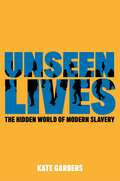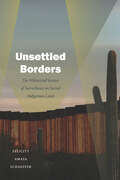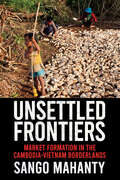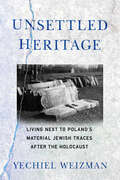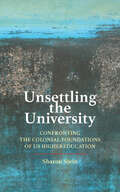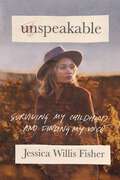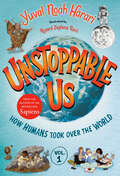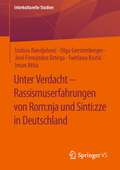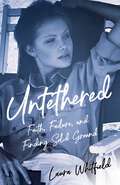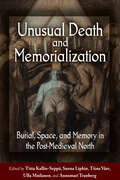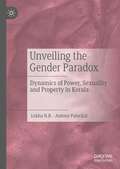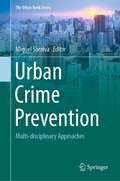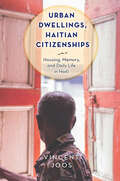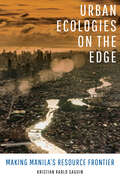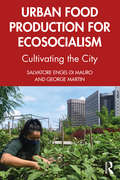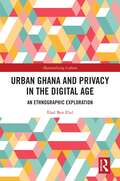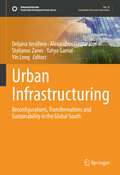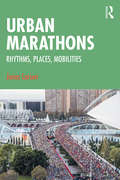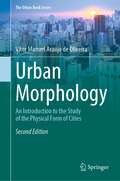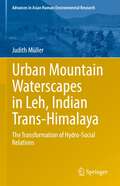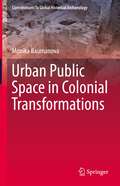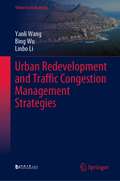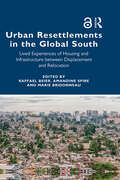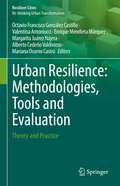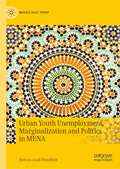- Table View
- List View
Unseen Lives: The Hidden World of Modern Slavery
by Kate Garbers'...a fully grown man utterly broken by what he had experienced, physically and mentally exhausted with physical evidence showing the overt signs of the abuse he had been through.'This is how Kate Garbers met Riso, a man who had been trafficked and in forced labour for months, with no way out. Modern slavery is far closer than we think. Yet it is largely unseen and unknown to most of us - a crime against humanity hidden in plain sight.In this revealing exposé, Kate Garbers shares moving stories of survivors she has met and shares insights she has gained through over a decade of anti-slavery work. Survivor stories are complemented by a forensic account of how modern slavery works and the many forms it can take - from forced labour to organ harvesting - and how it is enabled to continue by our current laws and systems.Unseen Lives also provides a vision of hope for those looking to challenge and dismantle modern slavery, laying out what changes we need to make as individuals and as a society in order to effectively tackle modern slavery and improve the support of survivors.
Unsettled Borders: The Militarized Science of Surveillance on Sacred Indigenous Land (Dissident Acts)
by Felicity Amaya SchaefferIn Unsettled Borders Felicity Amaya Schaeffer examines the ongoing settler colonial war over the US-Mexico border from the perspective of Apache, Tohono O’odham, and Maya who fight to protect their sacred land. Schaeffer traces the scientific and technological development of militarized border surveillance across time and space from Spanish colonial lookout points in Arizona and Mexico to the Indian wars, when the US cavalry hired Native scouts to track Apache fleeing into Mexico, to the occupation of the Tohono O’odham reservation and the recent launch of robotic bee swarms. Labeled “Optics Valley,” Arizona builds on a global history of violent dispossession and containment of Native peoples and migrants by branding itself as a profitable hub for surveillance. Schaeffer reverses the logic of borders by turning to Indigenous sacredsciences: ancestral land-based practices that are critical to reversing the ecological and social violence of surveillance, extraction, and occupation.
Unsettled Frontiers: Market Formation in the Cambodia-Vietnam Borderlands
by Sango MahantyUnsettled Frontiers provides a fresh view of how resource frontiers evolve over time. Since the French colonial era, the Cambodia-Vietnam borderlands have witnessed successive waves of market integration, migration, and disruption. The region has been reinvented and depleted as new commodities are exploited and transplanted: from vast French rubber plantations to the enforced collectivization of the Khmer Rouge; from intensive timber extraction to contemporary crop booms. The volatility that follows these changes has often proved challenging to govern. Sango Mahanty explores the role of migration, land claiming, and expansive social and material networks in these transitions, which result in an unsettled frontier, always in flux, where communities continually strive for security within ruptured landscapes.
Unsettled Heritage: Living next to Poland's Material Jewish Traces after the Holocaust
by Yechiel WeizmanIn Unsettled Heritage, Yechiel Weizman explores what happened to the thousands of abandoned Jewish cemeteries and places of worship that remained in Poland after the Holocaust, asking how postwar society in small, provincial towns perceived, experienced, and interacted with the physical traces of former Jewish neighbors.After the war, with few if any Jews remaining, numerous deserted graveyards and dilapidated synagogues became mute witnesses to the Jewish tragedy, leaving Poles with the complicated task of contending with these ruins and deciding on their future upkeep. Combining archival research into hitherto unexamined sources, anthropological field work, and cultural and linguistic analysis, Weizman uncovers the concrete and symbolic fate of sacral Jewish sites in Poland's provincial towns, from the end of the Second World War until the fall of the communist regime. His book weaves a complex tale whose main protagonists are the municipal officials, local activists, and ordinary Polish citizens who lived alongside the material reminders of their murdered fellow nationals. Unsettled Heritage shows the extent to which debating the status and future of the material Jewish remains was never a neutral undertaking for Poles—nor was interacting with their disturbing and haunting presence. Indeed, it became one of the most urgent municipal concerns of the communist era, and the main vehicle through which Polish society was confronted with the memory of the Jews and their annihilation.
Unsettling the University: Confronting the Colonial Foundations of US Higher Education (Critical University Studies)
by Sharon SteinShifts the narrative around the history of US higher education to examine its colonial past.Over the past several decades, higher education in the United States has been shaped by marketization and privatization. Efforts to critique these developments often rely on a contrast between a bleak present and a romanticized past. In Unsettling the University, Sharon Stein offers a different entry point—one informed by decolonial theories and practices—for addressing these issues.Stein describes the colonial violence underlying three of the most celebrated moments in US higher education history: the founding of the original colonial colleges, the creation of land-grant colleges and universities, and the post–World War II "Golden Age." Reconsidering these historical moments through a decolonial lens, Stein reveals how the central promises of higher education—the promises of continuous progress, a benevolent public good, and social mobility—are fundamentally based on racialized exploitation, expropriation, and ecological destruction.Unsettling the University invites readers to confront universities' historical and ongoing complicity in colonial violence; to reckon with how the past has shaped contemporary challenges at institutions of higher education; and to accept responsibility for redressing harm and repairing relationships in order to reimagine a future for higher education rooted in social and ecological accountability.
Unspeakable: Surviving My Childhood and Finding My Voice
by Jessica Willis FisherUsing the written word as her witness statement, Jessica Willis Fisher gives a lacerating portrait of a girl finding her voice after years of being silenced and an unforgettable story of risk and faith.Growing up the eldest daughter in a large, highly controlled, fundamentalist Christian household, Jessica Willis was groomed to perform, and to conform to her father's disturbing and chaotic teachings. Cut off from anything unapproved by her father, Jessica was persistently curious about the outside world, always wondering what was normal or potentially dangerous about her upbringing.When the Willis family rocketed into fame after their appearances on multiple televised talent competitions in 2014, Jessica and her family landed their own reality TV show and toured across the globe, singing and dancing for millions. The world loved this beautiful family of kids; young and vivacious, the Willis's presented themselves to be extraordinary and happy. But the older and wiser Jessica got, the more she had to face that what was going on behind closed doors would forever be escalating.In this elegant, harrowing story of the manipulation and codependency that defines abusive family relationships, Jessica Willis Fisher lets us see the formative moments of her childhood through her eyes. Fisher's haunting coming-of-age memoir captures the beauty and ugliness of a young woman finding her way—filled with longing, fear, confusion, secrecy, and most importantly, hope for the future.Unspeakable: Surviving My childhood and Finding My Voice shares:An unflinching look at the manipulation and codependency that defines abusive family relationshipsThe formative moments of Jessica's childhood through her eyesAn unforgettable story of courage and strengthBeautifully written and monumental in its bravery, Fisher's story is proof that we can all become so much more that the things that happen to us.
Unstoppable Us, Volume 1: How Humans Took Over the World
by Yuval Noah HarariFrom world-renowned historian and philosopher Yuval Noah Harari, the New York Times bestselling author of Sapiens, comes an exciting, brand-new illustrated book for middle-grade readers that looks at the epic true story of humankind.Even though we'll never outrun a hungry lion or outswim an angry shark, humans are pretty impressive—and the most dominant species on the planet. So, how did we become "unstoppable"?The answer to that is one of the strangest tales you&’ll ever hear. And it&’s a true story.From learning to make fire and using the stars as guides to cooking meals in microwaves and landing on the moon, prepare to uncover the secrets and superpowers of how we evolved from our first appearances millions of years ago.Acclaimed author Yuval Noah Harari has expertly crafted an extraordinary story of how humans learned to not only survive but also thrive on Earth, complete with maps, a timeline, and full-color illustrations that bring his dynamic, unputdownable writing to life.Includes: a timeline, maps, further reading, and other resources for young readers to reference.
Unter Verdacht – Rassismuserfahrungen von Rom:nja und Sinti:zze in Deutschland (Interkulturelle Studien)
by Iman Attia Isidora Randjelović Olga Gerstenberger José Fernández Ortega Svetlana KostićRom:nja und Sinti:zze berichten von Ausschlüssen, Barrieren und Gewalt in allen Lebenssituationen. Das community-basierte Forschungsprojekt zeigt die Wirkungsweisen dieses spezifischen Rassismus auf, ebenso wie die historischen Kontinuitäten und Nachwirkungen, die Allgegenwart und die alltäglichen Folgen für das Leben von Rom:nja und Sinti:zze. Die Rekonstruktion des Geflechts ineinandergreifender Praktiken zeigt eindrücklich, dass Rassismus auch kumulativ wirkt und zu einer Spirale von Diskriminierung führen kann. Das Buch schließt mit Empfehlungen für verschiedene Politikbereiche.
Untethered: Faith, Failure, and Finding Solid Ground
by Laura WhitfieldWhen Laura Whitfield was fourteen, her extraordinary brother, Lawrence, was killed in a mountain climbing accident. That night she had an epiphany: Life is short. Dream big, even if it means taking risks. So, after graduating from high school, she set out on her own, prepared to do just that.Laura spent her first summer after high school on North Carolina&’s Outer Banks, a magical few months filled with friendships, boys, and beer. There she met a handsome DJ who everyone called &“Steve the Dream,&” and risked her heart. When September came, Steve moved to New York City to become a model —prompting Laura to start thinking about modeling, too. After just one semester of college, still seeking to fill the void left by her brother&’s death, she dropped out and moved to New York to become a cover girl. But while juggling the demands of life in the big city—waiting tables, failed relationships, and the cutthroat world of modeling—she lost her way. A stirring memoir about a young woman&’s quest to find hope and stability after devastating loss, Untethered is Laura&’s story of overcoming shame, embracing faith, and learning that taking risks—and failing—can lead to a bigger life than you've ever dared to imagine.
Unusual Death and Memorialization: Burial, Space, and Memory in the Post-Medieval North
by Titta Kallio-Seppä, Sanna Lipkin, Tiina Väre, Ulla Moilanen Annemari TranbergMost cultures and societies have their own customs and traditions of treating their dead. In the past, some deceased received a burial that deviated from tradition. The reasons for unusual burial could result from reasons such as outbreaks of epidemics or wars, or from premature births, distinctive social status, or disability. Authors present a selection of cases addressing the issue of unusual deaths, burials, or ways to remember the deceased. Chapters explore theoretical views related to social memory of death and memorializing the deceased and their resting places during modern period. The case studies introduce varied views on ‘otherness’ that are visible in burial customs and memorialization.
Unveiling the Gender Paradox: Dynamics of Power, Sexuality and Property in Kerala
by Lekha N.B. Antony PalackalBoth nationally and internationally, the south Indian state of Kerala has been an object of study for its matrilineal kinship organization among some communities, as well as its achievements in education, literacy, and life expectancy for women against a weak economic base. Nonetheless, scholars have drawn attention to a paradox in Kerala’s model of development, namely women’s deteriorating social position in Kerala and the rise in violence against women. Against this backdrop, this book explores the intersections of gender, sexuality, marriage, family and kinship as related to the matrilineal Nayar community in Kerala. Chapters unravel the interplay between the triple categories of gender, power and social development as they play out at the micro, meso, and macro levels of society, probing the ways in which Nayar women practice agency. Ultimately, the authors explore how the strength of the Nayar community can be used as a case study toward circumventing the prevailing gender paradox and re-imagine a more liberated, empowered and self-reliant woman not only in Kerala, but in India at large. This book will be of interest to scholars in sociology, gender studies, and development studies, particularly those with a focus on South Asia.
Urban Crime Prevention: Multi-disciplinary Approaches (The Urban Book Series)
by Miguel SaraivaThis book provides an original cross-thematic and wide scope review of crime prevention processes in urban areas that are explicitly based on the cooperation between different scientific and professional fields. Focusing primarily on environmental and community-based crime prevention, this book compiles a peer-reviewed collection of papers and prospective essays that explore how, and to what extent, multi-disciplinarity can be used as a cornerstone for achieving safer cities.Relying on the input from specialists, researchers, decision-makers, and practitioners from around the world, it covers the various stages from theory to implementation, by discussing theoretical stances, interpreting policy and planning guidelines, uncovering unique educational experiences, and narrating insights and lessons learned from innovative research and practice. Hence, it provides vivid discussions and invaluable insights into processes of partnership building, planning, and management, oriented towards establishing successful mechanism for preventing crime and reducing feelings of insecurity in urban areas.
Urban Dwellings, Haitian Citizenships: Housing, Memory, and Daily Life in Haiti (Critical Caribbean Studies)
by Vincent JoosUrban Dwellings, Haitian Citizenships explores the failed international reconstruction of Port-au-Prince after the devastating 2010 earthquake. It describes the failures of international aid in Haiti while it analyzes examples of Haitian-based reconstruction and economic practices. By interrogating the relationship between indigenous uses of the cityscape and the urbanization of the countryside within a framework that centers on the violence of urban planning, the book shows that the forms of economic development promoted by international agencies institutionalize impermanence and instability. Conversely, it shows how everyday Haitians use and transform the city to create spaces of belonging and forms of citizenship anchored in a long history of resistance to extractive economies. Taking readers into the remnants of failed industrial projects in Haitian provinces and into the streets, rubble, and homes of Port-au-Prince, this book reflects on the possibilities and meanings of dwelling in post-disaster urban landscapes.
Urban Ecologies on the Edge: Making Manila's Resource Frontier
by Kristian Karlo SaguinLaguna Lake, the largest lake in the Philippines, supplies Manila's dense urban region with fish and water while operating as a sink for its stormflows and wastes. Transforming the lake to deliver these multiple urban ecological functions, however, has generated resource conflicts and contradictions that unfold unevenly across space. In Urban Ecologies on the Edge, Kristian Karlo Saguin tracks the politics of resource flows and unpacks the narratives of Laguna Lake as Manila's resource frontier. Provisioning the city and keeping it safe from floods are both frontier-making processes that bring together contested socioecological imaginaries, practices, and relations. Combining fieldwork and historical accounts, Saguin demonstrates how people—powerful and marginalized—interact with the state and the environment to produce the unequal landscapes of urbanization at and beyond the city's edge.
Urban Food Production for Ecosocialism: Cultivating the City
by George Martin Salvatore Engel-Di MauroThis book explores the critical role of urban food production in strengthening communities and in building ecosocialism. It integrates theory and practice, drawing on several local case studies from seven countries across four continents: China, Cuba, Ghana, Italy, Tanzania, the UK, and the US. Research shows that the term "urban agriculture" overstates the limited food-growing potential in cities due to a shortage of land required for growing grains, the basic human food staple. For this reason, the book suggests "urban cultivation" as an appropriate term which indicates social and political progress achieved through combined labours of urbanites to produce food. It examines how these collaborative food-growing efforts help raise local social capital, foster community organisation, and create ecological awareness in order to promote urban food production while also ensuring environmental sustainability. This book illustrates how urban cultivation constitutes a potentially important aspect of urban ecosystems, as well as offers solutions to current environmental problems. It recentres attention to the global South and debunks Eurocentric narratives, challenging capitalist commercial food-growing regimes and encouraging ecosocialist food-growing practices. Written in an accessible style, this book is recommended reading about an emergent issue which will interest students and scholars of environmental studies, geography, sociology, urban studies, politics, and economics.
Urban Ghana and Privacy in the Digital Age: An Ethnographic Exploration (Materializing Culture)
by Elad Ben ElulThis book explores privacy practices and the role of digital technologies in the lives of urban Ghanaians, considering how they use language, materiality, and culture to maintain sharp boundaries between the private and public. Focusing on the harbour town of Tema, it offers rich ethnographic portraits that cover topics such as nightlife, domestic architecture, religion, and social media. The volume demonstrates how transformations across Africa such as Pentecostal reformation, neoliberal reforms, and rapid digitisation all raise the need for privacy among middle-class urbanites who use brand new (and very traditional) strategies to uphold an image of their economic or religious state. Overall the book highlights how digital technologies intertwine with local cultures and histories, and how digital anthropology enhances our understanding of the offline as much as the online. It makes a valuable contribution to discourse about the right for privacy and surveillance in the digital age, and will be of interest to scholars from anthropology and African studies.
Urban Infrastructuring: Reconfigurations, Transformations and Sustainability in the Global South (Sustainable Development Goals Series)
by Alexandros Gasparatos Deljana Iossifova Stylianos Zavos Yahya Gamal Yin LongThis book is about urban infrastructuring as the processes linking infrastructural configurations and their components with other social, ecological, political, or otherwise defined systems as part of urbanisation and globalisation in the Global South. It suggests that infrastructuring is essential to urbanisation and that it is entangled with socio-spatio-ecological transformations that often have negative outcomes over time. Furthermore, it argues that infrastructuring requires an ethical positioning in research and practice in order to enhance infrastructural sustainability in the face of intersecting environmental, social and economic crises. “Urban Infrastructuring” is developed in three parts. First, it identifies infrastructural entanglements across various urban and urbanising settings in the Global South. Second, it highlights some of the damaging processes and outcomes of urban infrastructuring and argues that the absence, presence and transformation of infrastructure in the Global South (re-)produces socioecological injustice in the short- and long term. Third, the book argues for a shift of infrastructuring agendas towards more just and sustainable interventions. It suggests that an ethico-politics of care should be embedded in systems approaches to infrastructuring in both research and practice. The edited volume contains contributions from authors with backgrounds in a variety of academic disciplines from the natural and social sciences, engineering and the humanities. It provides valuable insights for anyone concerned with the study, design, planning, implementation and maintenance of urban infrastructures to enhance human well-being and sustainability. It will be of interest to researchers and urban decision-makers alike.
Urban Marathons: Rhythms, Places, Mobilities
by Jonas LarsenThis original social science text approaches marathon running as an everyday practice and a designed event, to draw upon and contribute to the literature on practice theory, urban events, rhythmanalysis and mobility. It bridges sport studies and discussions within sociology and geography about practice, movement and the city. Inspired by theoretical debates about embodied and multi-sensuous mobilities, social and material practices, and urban rhythms, this book explores the characteristics of marathon running as a bodily practice on the one hand and, on the other, marathon training grounds and events as unique places. This account takes marathon running seriously, using sociological and geographical theory to understand the practice in and of itself. Based on original empirical research and accessible to readers, taking them to training sessions in Copenhagen and to marathons in Tokyo, Kyoto, Berlin, Frankfurt, Valencia and Copenhagen, it draws out the globalised, codified and generic nature of marathon practices and design, yet also brings out the significant local differences. The book examines in ethnographic detail how marathon practices and places are produced by various materialities, cultural scripts, experts, runners and spectators, and practiced in embodied, multi-sensuous and ‘emplaced’ ways by ordinary runners. It develops a sociological practice approach to marathon running and geographical understanding of marathon places and rhythms. It demonstrates that marathon running is of broad interest because it calls for and allows lively and expressive ways of conducting and writing research and understanding the becoming of bodies, the intertwining of biological and mechanical rhythms, and the eventful potential of streets. It will appeal to postgraduate students and scholars in sport studies, geography and sociology interested in running, active mobility and ethnography, as well as tourism and urban events. The book will also appeal to general readers with an interest in marathon running.
Urban Morphology: An Introduction to the Study of the Physical Form of Cities (The Urban Book Series)
by Vítor Manuel Araújo de Oliveira'This is a textbook about cities or, more precisely, about the physical form of cities. It provides an overview of the main elements of urban form—streets, street blocks, plots and buildings—structuring our cities and the fundamental agents and processes of transformation shaping these elements. It applies this analytical framework to describe the evolution of cities over history as well as to explain the functioning of contemporary cities. After the initial focus on the 'object' (cities), the book introduces how different schools of thought have been dealing with this object since the emergence of Urban Morphology, as the science of urban form, in the turning to the twentieth century. Finally, the book identifies the main contributions of urban morphology to cities, societies and economies. This second edition of the book offers updated and more accurate knowledge on several morphological issues, presents expanded contents, and it has a more explicit didactic nature, including a set of exercises in the end of each chapter, that will help teachers and students (in architecture, geography, planning, history, sociology and urban studies) in acquiring and consolidating their urban morphological knowledge.
Urban Mountain Waterscapes in Leh, Indian Trans-Himalaya: The Transformation of Hydro-Social Relations (Advances in Asian Human-Environmental Research)
by Judith MüllerThe city of Leh is located in the high mountain desert of Ladakh in the Indian Himalayas and access to water has always been limited there. In recent years, the town has experienced high rates of urbanisation on the one hand, and tourist numbers have increased exponentially on the other, which has implications for the water supply of the people living there. Through several years of on-site research, challenges on various levels were documented and current governance approaches were analysed. This research forms the basis for future approaches to sustainable development.
Urban Public Space in Colonial Transformations (Contributions To Global Historical Archaeology)
by Monika BaumanovaThis book offers an interdisciplinary perspective on the precolonial to colonial transition in an urban context, by focusing on the changing distribution, character and role of public spaces and buildings. The volume focuses on three case study regions: East African coast, North-West Africa, and the Iberian Peninsula. The regions are selected to provide a novel perspective on the socio-spatial impact of colonialism on the public life of urban settlements, driven by different political forces, in different geographical contexts and time periods. The three study areas are also linked by sharing several features of urban lifestyle such as the role of trade and the influence of religion, Islam in particular. The intertwined influence of socio-spatial urban characteristics on public life is presented on a range of case studies selected from Africa and southern Europe. The approaches are rooted in archaeological thinking on the built environment as material culture and incorporate critical interpretation of ethnographies and historical accounts on both the precolonial and colonial eras. This volume is of interest to archaeologists and researchers working in urban history, anthropology, and heritage.
Urban Redevelopment and Traffic Congestion Management Strategies (Urban Sustainability)
by Bing Wu Yanli Wang Linbo LiThis book focuses on the relationship between urban land redevelopment and traffic systems and discusses the related research. Consisting of three main parts, the first analyzes the interaction between land redevelopment and traffic congestion as well as the mechanisms and causes of traffic congestion. The second part presents strategies for the prevention and control of traffic congestion under urban land redevelopment, proposing a two-stage evaluation system of traffic congestion pre-inspection and traffic impact analysis in the planning and implementation stages of land redevelopment. Lastly, the third section includes an application case analysis of the proposed traffic congestion management strategy.
Urban Resettlements in the Global South: Lived Experiences of Housing and Infrastructure between Displacement and Relocation
by Raffael BeierUrban Resettlements in the Global South provides new perspectives on resettlement through an urban studies lens. To date, resettlement has been theorised through development studies and refugee studies, but urban resettlement is also a major dimension of urban development in the Global South and may help to rethink contemporary urban dynamics between spectacular new town developments and rising incidences of eviction and displacement. Conceptualising resettlement as a binding notion between production/regeneration and destruction/demolition of urban space helps to illuminate interdependencies and to underline significant ambiguities within affected people’s perspectives towards resettlement projects. This volume will offer an interesting selection of ten different case studies with rich empirical data from Latin America, North and Sub-Saharan Africa, and Asia, focused on each stage of resettlement (before, during, after relocation) through different timescales. By offering a frame for analysing and rethinking resettlement within urban studies, it will support any scholar or expert dealing with resettlement, displacement, and housing in an urban context, seeking to improve housing and planning policies in and for the city.
Urban Resilience: Theory And Practice (Resilient Cities Series)
by Octavio Francisco González Castillo Valentina Antoniucci Enrique Mendieta Márquez Margarita Juárez Nájera Alberto Cedeño Valdiviezo Mariana Osorno Castro<p>This book presents a select set of papers from an international and multidisciplinary approach, outlining the vanguard in the field of methodology, tools, and evaluation of the movement towards urban resilience.<p> <p>Reflecting on and redesigning the guidelines that orient the planning and management of urban development has become, today, an issue of global scope and priority that demands the committed and determined participation of society. Faced with the formidable challenge of guiding our cities towards sustainability, it is necessary to develop new approaches, paradigms, models, methodologies, and tools that make it possible to assess and raise the resilience profile of urban socio-ecosystems. The experiences that are developed in this book offer a wide and diverse set of concepts, theories, methodologies, instruments, and casuistry, impregnated by resilience notion, to inspire, influence, and guide thinking and practice for architects, urban planners, government officials, businessmen, civil and research organizations.<p> <p>In this book, the reader will be able to review either theoretical-methodology to organize notions on urban resilience, or application cases in a variety of areas and subsystems of a city but, being all of them inevitably and intricately linked through a complex matrix of structures and interactions that determine future, well-being, and resilience of urban socio-ecosystems in the global anthropo-environment.<p>
Urban Youth Unemployment, Marginalization and Politics in MENA (Middle East Today)
by Rawan Asali NuseibehThis book focuses on Arab youth marginalization along intersectional lines of gender, ethnicity and social class in four cities: Jerusalem, Amman, Cairo, and Tunis. The author explores how the political and economic climates in each city influence the life prospects of youth and uncovers their narratives around their aspirations, disappointments and life choices. Providing an interdisciplinary approach, the project will interest a wide range of audiences including graduate students, scholars, and policy makers in the fields of the Middle Eastern studies, political science, urban studies, and education.
